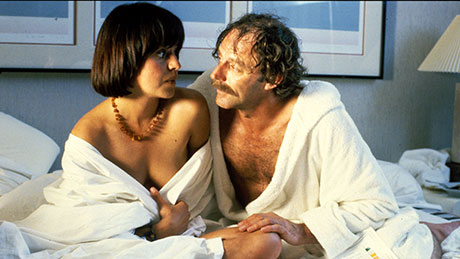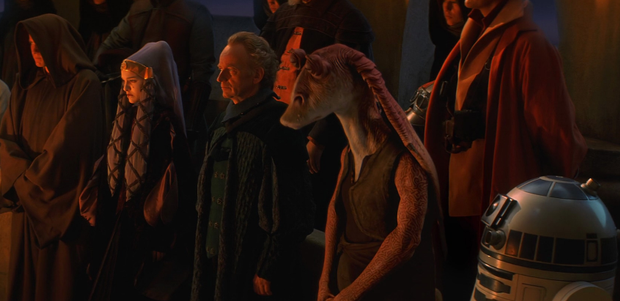Control Nathan Rabin #64 Bliss (1985)
Welcome, friends, to the latest entry in Control Nathan Rabin 4.0. It’s the career and site-sustaining column that gives YOU, the kindly, Christ-like, unbelievably sexy Nathan Rabin’s Happy Place patron, an opportunity to choose a movie that I must watch, and then write about, in exchange for a one-time, one hundred dollar pledge to the site’s Patreon account. The price goes down to seventy-five dollars for all subsequent choices.
It is hard to overstate the importance of this column, and the pledges behind it when it comes to the success and future of this very time and labor intensive website. I hit a wall hard about a year and a half ago in terms of patrons and monthly income. Control Nathan Rabin 4.0 alone gave me the power to break through that wall, Kool-Aid Man-style.
The income from the column has single-handedly allowed the site’s Patreon to grow instead of remaining static or decreasing. The problem is that Control Nathan Rabin 4.0 income is inherently unstable. It can rise dramatically one month and then die completely the next.
I basically need to make between three and four thousand dollars a month in Patreon income to keep Nathan Rabin’s Happy Place a full-time job that pays the bills and will not send me and my family hurtling into the poorhouse. On good months I come tantalizingly close to hitting that four thousand dollar goal and I feel very good and very confident about the financial future of the site.
Then there are months like the last two, when new Control Nathan Rabin 4.0 pledges have more or less dried up completely but a whole bunch of Control Nathan Rabin 4.0 pledges have either decreased or been deleted.
This month for the first time in well over a year the site’s Patreon income dipped well below three thousand dollars. Not gonna lie: that worried me. It worried me because I’ve always foolishly thought of three thousand dollars as the bare minimum the site could bring in (we don’t have advertising or sponsors so we’re wholly dependent on pledges to survive) and now I’m looking to get back to that magical, magical amount.
How do I get there? Control Nathan Rabin 4.0. As with seemingly every other aspect of the site, I feel like I have been doing a really good job with Control Nathan Rabin 4.0 both in terms of quality and quantity. But I could always do better!
My God, this is the sixty-fourth Control Nathan Rabin 4.0 article in about a year and a half so I definitely have not been ignoring this crucial column but I have not been maximizing it either so for the indefinite future expect a whole lot more Control Nathan Rabin 4.0 articles.
I’ve been writing these on a weekly basis: I hope to double or triple that in the weeks and months ahead.
That’s because I very much need to make my way through the Control Nathan Rabin 4.0 backlog so I can give the nice people what they paid for but also because I desperately need a fresh influx of Control Nathan Rabin 4.0 pledges so I can stop the bleeding, pledge-wise, and get the site back on more solid financial ground.
How do I inspire more Control Nathan Rabin 4.0 pledges? By writing Control Nathan Rabin 4.0 articles about movies readers are actually interested in, like The Canyons or Manos the Hands of Fate, not just the kindly benefactor who chose an individual film.
Alas, I remain powerfully motivated by self-sabotage so of all the Control Nathan Rabin 4.0 options at my disposal I self-defeatingly chose perhaps the least commercial option: the 1985 Australian dark comedy Bliss.
It’s a movie so obscure even I wasn’t familiar with it and I have devoted my life and career to exploring obscure pop culture ephemera. At least I thought I was not familiar with the film.
The title Bliss meant nothing to me but then I saw the film’s videocassette cover and suddenly a flood of memories came rushing back.
I reconnected instantly with the twelve-year-old me who would waste his days perambulating about video stores, day-dreaming about all the wonders contained within. Oh, but the Bliss poster took me back!
The VCR and later DVD box cover is a singular combination of art and trash, surrealism and sordid sensationalism. It’s a curious tableau of a mustachioed, hat-wearing businessman, his face and torso the dreamy colors of a cotton candy cloud-filled Magritte sky looming behind a sexy, big-haired temptress holding out an apple of temptation (how biblical!) in front of a snake slithering out of the grass. That, also, may be biblical as well.
In the background an elephant sits on an unfortunate red car, smashing it in the process while his pachyderm brethren float in the sky behind him, kept aloft by some unknown source.
Bliss makes the movie it’s so enigmatically selling look crazy and sexy and surreal in a way that’s at once fundamentally honest yet deeply misleading.
The film does indeed feature a mustachioed man and a sexy woman and an elephant sitting on a car and doing terrible things for its resale value in the process but it’s fundamentally an oddball social satire about a man in the grips of a ferocious middle-aged crisis.
The wonderful Barry Otto lends his droopy mustache and excess of tragicomic humanity to the juicy role of Harry Joy, a raconteur and adman in 1980s Australia whose comfortable life of empty pleasure is shook up when he has a heart attack, dies for four minutes and has an out of body experience that forever changes his perspective on the world.
In mid-life crisis movies advertising is less a profession less than a form of soul-sickness. Like the titular character in A Serious Man, Harry wants desperately to do good, to be good, to serve as a positive force in a world gone mad.
Bliss resembles A Serious Man in other respects as well. Like Michael Stuhlbarg in that wonderful, wonderful film, the wonderful Barry Otto has the impressive quality of being at once an eminently relatable everyman easy to identify and empathize with and incredibly specific, a three-dimensional character realized down to a molecular level.
In order to do that, Harry needs to find a way to not only leave his innately corrupt, soul-sucking profession but also to make spiritual and karmic amends for spending his adult life trying to trick the brainwashed masses into buying things they don’t need for the benefit of a few insanely powerful billionaires who control everything.
Ah, but good old Harry’s life is a mess in other ways as well. His wife is flagrantly cheating on him. Harry’s son is a cocaine-dealing, Nazi-fetishizing wannabe New York business titan who makes his own cocaine-addicted Communist sister perform oral sex on him in exchange for her fix. Harry has a John Waters home life, a grotesque caricature of bourgeoisie depravity chockablock with incest, infidelity, prostitution, hard drugs and contempt.
Harry wants to be a force for good so he decides to only do business with good clients, which is a good way to both feel good about yourself and go out of business.
When he gets out of the hospital Harry picks up the mid-life crisis starter kit and goes to town. The cinematic mid-life crisis starter kit of course includes a job in advertising or a similarly soulless, evil profession as well as an emasculating, angry, shrewish wife who makes domesticity seem like a prison to be avoided at all costs. A couple of piece of shit kids are also part of a very bad bargain.
It’s enough to make a respectable husband, father and small businessman want to escape the dreary strictures of upper-middle class life and embark on a rule-breaking quest for authenticity and truth.
How does the middle-aged, existentially lost cinematic protagonist achieve that truth and authenticity? Why with a marijuana cigarette and a much younger woman to have sex with, a free-spirited hippie, ideally, but sex workers like Bliss’ Honey Barbara (Helen Jones) will do in a pinch as well.
How deliciously ironic that comedy-dramas about breaking free from the stolid conventions of everyday life like Bliss are so fundamentally conventional. But if Bliss has many of the beats and themes of movies like American Beauty, it’s redeemed by a surreal, resigned, underlying sadness.
After his near-death, out-of-body experience Harry begins to fall apart mentally. He becomes convinced that he either died from the heart attack and is living in hell or that he’s lost his mind. Then again, in the savagely satirical realm of Bliss everyday life for an everyday bloke like Harry has a funny way of resembling both eternal damnation and a form of incurable madness.
Harry eventually ends up in a mental institution not because he himself is mad but rather because he inhabits a mad world and is now wonderfully, horribly able to see the world for what it is, not what we want and need it to be.
Bliss is the feature-film adaptation of the debut novel of Peter Carey, a two-time Booker Prize winner and one of the leading lights in Australian literary circles. It’s a very literary motion picture, particularly in its narration, intermittent splashes of surrealism and pitch-black comedy.
It’s a tart and winning character study that slows to a crawl in its last twenty minutes or so once Harry has left polite civilization altogether to pursue his bliss, and the woman who makes his heart sing.
About fifteen minutes before Bliss ended my wife came into the living room with our baby and said, “This looks weird and bad. What’s it about?” and I struggled to come up with a concise, accurate answer.
What is Bliss about? It’s about men. It’s about women. It’s about society and advertising and mid-life crises and the quest for meaning in consumer society. It’s about the insanity of thinking that our world is sane, and the life-affirming epiphany that the only truth and meaning in this world come from within.
I’m pleased that I was finally able to satiate my long-simmering curiosity about the movie with the weird poster with the snake and the temptress and the elephant sitting on a car, and get paid in the process.
That leaves only several million other movies with weirdly memorable home video packaging I can write about for this column at your request. I’m excited to write about more inventively advertised obscurities like this, even if, by definition, they cannot live up to the craziness advertised on their hard-working, crazily over-achieving posters and DVD covers.
Support independent media, or, more pointedly, choose a film for this column over at https://patreon.com/nathanrabinshappyplace
AND of course the Weird Accordion to Al book crowd-funding campaign is live and amazing over at https://make-the-weird-accordion-to-al-book-a-ridiculous-r.backerkit.com/hosted_preorders#







